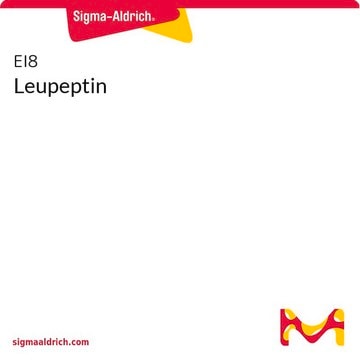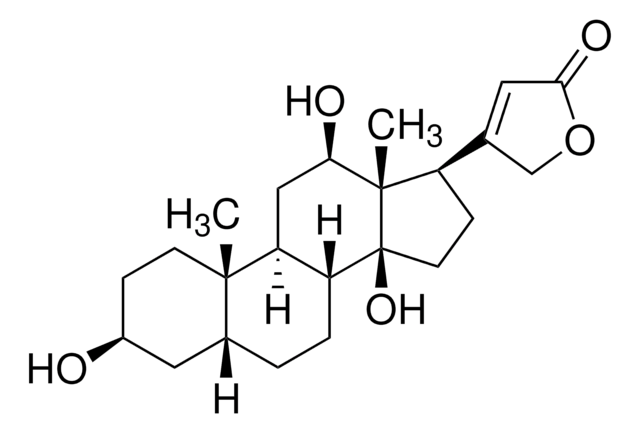E3132
E-64
protease inhibitor
Synonim(y):
trans-Epoxysuccinyl-L-leucylamido(4-guanidino)butane, L-trans-3-Carboxyoxiran-2-carbonyl-L-leucylagmatine, N-(trans-Epoxysuccinyl)-L-leucine 4-guanidinobutylamide
About This Item
Polecane produkty
pochodzenie biologiczne
synthetic (organic)
Próba
≥98% (HPLC)
Postać
powder
rozpuszczalność
water: 20 mg/mL, clear, colorless to faintly yellow
temp. przechowywania
2-8°C
ciąg SMILES
CC(C)C[C@H](NC(=O)[C@@H]1O[C@H]1C(O)=O)C(=O)NCCCCNC(N)=N
InChI
1S/C15H27N5O5/c1-8(2)7-9(20-13(22)10-11(25-10)14(23)24)12(21)18-5-3-4-6-19-15(16)17/h8-11H,3-7H2,1-2H3,(H,18,21)(H,20,22)(H,23,24)(H4,16,17,19)/t9-,10+,11+/m0/s1
Klucz InChI
LTLYEAJONXGNFG-HBNTYKKESA-N
Szukasz podobnych produktów? Odwiedź Przewodnik dotyczący porównywania produktów
Opis ogólny
- cathepsin K
- cathepsin L
- cathepsin S
- calpain
- cathepsin B
- cathepsin H
- papain
Zastosowanie
Działania biochem./fizjol.
Uwaga dotycząca przygotowania
Kod klasy składowania
11 - Combustible Solids
Klasa zagrożenia wodnego (WGK)
WGK 3
Temperatura zapłonu (°F)
Not applicable
Temperatura zapłonu (°C)
Not applicable
Środki ochrony indywidualnej
Eyeshields, Gloves, type N95 (US)
Certyfikaty analizy (CoA)
Poszukaj Certyfikaty analizy (CoA), wpisując numer partii/serii produktów. Numery serii i partii można znaleźć na etykiecie produktu po słowach „seria” lub „partia”.
Masz już ten produkt?
Dokumenty związane z niedawno zakupionymi produktami zostały zamieszczone w Bibliotece dokumentów.
Klienci oglądali również te produkty
Produkty
Uncover properties and applications of the cysteine protease papain and find inhibitors, substrates, and other papain products.
ReadyShield® phosphatase and protease inhibitor cocktail FAQ for sample protection in a variety of cell types and tissue extracts, including mammalian, plant, and microbial samples. Our ReadyShield® Protease Inhibitor Cocktail is a non-freezing solution that contains inhibitors with a broad specificity for serine, cysteine, acid proteases and aminopeptidases.
Nasz zespół naukowców ma doświadczenie we wszystkich obszarach badań, w tym w naukach przyrodniczych, materiałoznawstwie, syntezie chemicznej, chromatografii, analityce i wielu innych dziedzinach.
Skontaktuj się z zespołem ds. pomocy technicznej








![N-[(2S,3R)-3-Amino-2-hydroxy-4-phenylbutyryl]-L-leucine 97%](/deepweb/assets/sigmaaldrich/product/structures/938/715/04f08fd1-8b5f-425c-a0bb-bbf530256760/640/04f08fd1-8b5f-425c-a0bb-bbf530256760.png)


